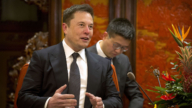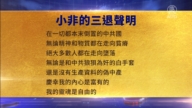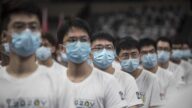【新唐人2012年1月19日訊】北京國家統計局公布,中國去年第4季度GDP增速放緩到8.9%,去年全年GDP增速達9.2%。《路透社》、《美聯社》等國際媒體認為,中國今年上半年經濟增速仍處於探底過程中,但可望實現「軟著陸」。而另有媒體和學者則擔憂中國經濟今年可能出現「硬著陸」。
在1月17號的國務院新聞辦發佈會上,統計局局長馬建堂表示,2011年儘管GDP增速在逐季回落,但在很大程度上符合宏觀調控的目標。
馬建堂說,2011年,國際金融危機的影響仍在繼續,對2012年經濟發展要有憂患意識。
「紐約城市大學」經濟學教授陳志飛表示,中共一貫報喜不報憂,馬建堂的提醒顯示形勢嚴峻。
陳志飛:「說明中國經濟現在下滑的傾向,已經不是表面的貼貼補補、數據造假能夠掩蓋的,整體結合起來可以得出一個結論,就是中國的經濟現在形勢還是非常嚴峻的,的確是令人擔憂的。」
商務部18號公布,2011年歐美對華投資有所下降,美國投資同比下降26.07%。歐盟27國投資下降3.65%。
英國《衛報》12號引述「法國興業銀行」經濟戰略負責人愛德華茲的分析說,中國很可能在2012年出現「硬著陸」,把全球經濟危機引向高潮。愛德華茲警告說,中國經濟在過去20年以大約10%的平均年增長率擴張,但是在西方出現二次探底經濟危機、以及中國本身出現房地產市場過熱的情況下,中國經濟未來可能面臨嚴重的問題。
陳志飛:「隨著今年歐債危機進一步深入,中國經濟只會再遇更大的挑戰。從國內來看,房地產的泡沫以及其他製造業、還有帶動經濟發展的其他方面整體萎縮,也會使中央政府一籌莫展,再加上還有揮之不去的夢魘通貨膨脹,整個造成了一個中國經濟無法跳出的怪圈。」
統計局最新數據顯示,中國城鎮人口在歷史上第一次超過農村,佔中國13億總人口的51.3%。
馬建堂認為,人口結構的變化對促進內需將起到積極作用。他不認為地方債務和房地產是中國經濟運行最大的風險。
北京經濟學家馮興元則表示,中國的GDP依然是靠政府投資和行政主導來拉動,與市場經濟背道而馳。今年上半年房地產業可能出現大洗牌,頂不住限購措施的民間投資將會退出。
馮興元:「去年由於限購措施出的比較多,影響到GDP總體的規模和增長率。它這個增長率是通過國進民退的方式保持 的,比如說大力的發展保障房,它實際上還是更增加政府投資的形式,來維持GDP的這樣一個成績。」
按照統計局公布的GDP總額計算,2011年中國人均GDP為5000多美元。「復旦大學」經濟學院副院長孫立堅認為,如果考慮通脹和匯率因素,人均GDP是否增長還有待商榷,甚至不排除有下滑的趨勢。
「北京大學」國民經濟核算研究中心研究員蔡志洲指出,2010年,中國人均GDP排名位列世界第95位,去年的水平也就和非洲納米比亞2010年的差不多。德國《明鏡》週刊評論說,對於中國來說,這幾乎是一個臨界值;不斷增長的富裕階層,需要與較低收入者共享成功,否則難避免大的社會動盪。
新唐人記者常春、李元翰、孫寧採訪報導。
2012: “Hard Landing" for China’s Economy?
Beijing’s National Bureau of Statistics revealed China’s GDP
growth in the fourth quarter slowed to 8.9% from 9.2% in 2011.
Reuters and Associated Press believe China’s economic growth
this year is still falling, but is expected to have a “soft landing."
Other media and academics are worried that China’s economy
this year may actually experience a “hard landing."
On January 17, at the State Council Information Office
press conference,
Chief of Bureau of Statistics, Ma Jiantang spoke about
China’s GDP growth.
Ma said, despite its decrease in 2011, GDP growth
was largely in line with macro-control goals.
Ma Jiantang commented that 2011’s global financial crisis
should invite concerns about 2012’s economic development.
Chen Zhifei, Professor of Economics from City University
of New York, said, the Chinese Communist Party (CCP) always reports the good rather than the bad news.
Ma Jiantang’s remarks are actually a reminder
of the severity of the situation.
Chen Zhifei: “There is a trend of decline in China’s economy
now. The surface fixes and false data can’t be hidden anymore.
Overall, the conclusion is that China’s economy
is still in a very grim situation, which is indeed worrying."
On January 18, the Ministry of Commerce announced that
China’s 2011 European and American investments declined.
US investments decreased 26.07%.
Investments from the EU decreased 3.65%.
On January 12, The Guardian cited Albert Edwards (Head of
economic strategy from the French bank “Societe Generale").
His analysis showed, China is likely to face a “hard landing"
in 2012 which will lead to the global economic crisis’ climax.
Edwards warned that the Chinese economy expended with
about 10% average annual growth over the past 20 years.
But with the two touches of the economic bottom in the West
and China’s overheated real estate market,
China’s economy may face serious problem in the future.
Chen Zhifei: “With the further deepening debt crisis in Europe
this year, China’s economy will encounter greater challenges.
From a domestic perspective, the real estate bubble
and overall decline of manufacturing industries,
as well as other aspects promoting economic development,
will make the CCP unable to do anything.
Plus the inflation, they all make a cycle,
which China’s economy cannot jump out of."
Bureau of Statistics’ latest figures show that China’s urban
population reached 51.3%, exceeding the rural population,
This is for the first time in China’s history.
Ma Jiantang believes that changes in population structure
will play a positive role in promoting domestic demand.
He does not think that local debt and real estate
are the largest risks of China’s economic performance.
Beijing economist, Feng Xingyuan, said that China’s GDP is
still dominated by the government’s investment and administration,
which runs counter to the market economy.
In the first half of 2012, real estate may experience
a major reshuffle.
Private investments unable to withstand restriction measures
will quit.
Feng Xingyuan: “Last year, the restriction measures affected
the overall size and growth rate of GDP.
The growth rate is kept in the way of national development
and people’s regression.
For example, the development of protection housing is in fact
a form of increasing government investment to maintain GDP."
According to the released GDP from Bureau of Statistics,
in 2011, China’s GDP per capita is 5,000 dollars.
Sun Lijian, Vice President of Economics at Fudan University
believes, GDP per capita is still questionable, and can have a downward trend.
Cai Zhizhou, Research Center of National Accounts from
Peking University pointed out that in 2010,
China’s GDP per capita ranked 95th in the world.
And that China’s last year figure was almost the same
as that of Namibia, Africa, for 2010.
Germany’s Der Spiegel commented that for China,
this is almost a critical value.
The growing wealthy class needs to share the success
with lower income class, otherwise, it will be difficult to avoid a great social upheaval.
NTD reporters Chang Chun, Li Yuanhan and Sun Ning.




























